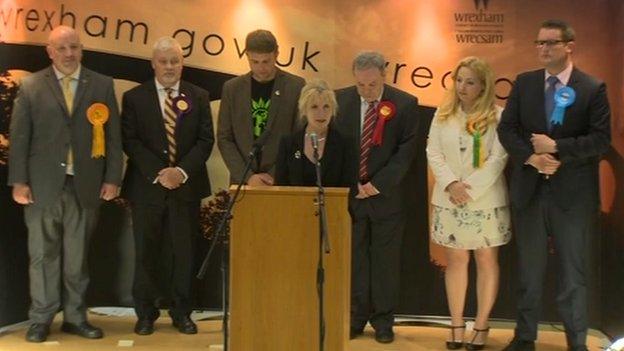Election 2015: Best Welsh Tory election for 30 years
- Published
A montage of some of the key moments as results came through in the General Election in Wales
Jubilant Conservatives are celebrating their best general election results in Wales for more than 30 years.
Craig Williams, who beat Labour to hold Cardiff North, said the Tories were "here to stay", as they won 11 of the 40 Welsh seats.
The party captured Gower by 27 votes, a constituency Labour had held for more than 100 years.
The Tories also gained Brecon and Radnorshire from the Lib Dems and Vale of Clwyd from Labour.
In a triumphant night for the Conservatives, the party achieved its best showing in Wales since 1983 and won the UK general election with an overall majority of 12 seats.
Arwyn Jones takes a look at the final election results for Wales
Overall the parties' share of the vote in Wales, compared to 2010 was:
Labour 37% (previously 36%)
Conservatives 27% (26%)
UKIP 14% (2%)
Plaid Cymru 12% (11%)
Liberal Democrats 6% (20%)
In terms of voting share across Wales, Labour and Conservative support is broadly similar to the previous general election.
But UKIP's share leapt from 2% to 14%, while the Liberal Democrat's plunged from 20% to 6%.
Nigel Farage says UKIP 'didn't exist' in south Wales five years ago
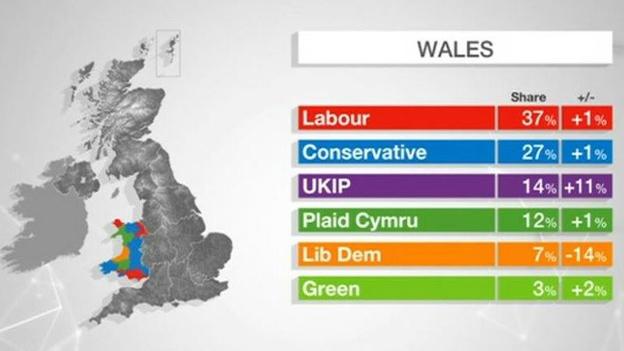
In terms of seats, the numbers are:
Labour 25 (down 1 from 2010)
Conservatives 11 (up 3)
Plaid Cymru 3 (no change)
Lib Dems 1 (down 2)
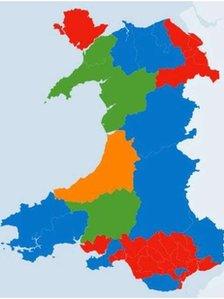
This is how Wales now looks politically after yesterday's vote
Craig Williams - who succeeded Jonathan Evans as Tory MP for Cardiff North - defied Labour to boost the Conservative majority from under 200 to more than 1,500.
He said: "This is Wales, this is meant to be Labour's pasture but the Welsh Conservatives are really here and here to stay.
"This is a game-changer for the Conservative Party in Wales... let's see what we can do."
Conservative Welsh Secretary Stephen Crabb said he was "obviously very happy" at a "great set of results".
Meanwhile, the Tories' coalition partners the Lib Dems have been virtually wiped out - holding just one seat.
Plaid Cymru retained three seats but failed to make gains.
Craig Williams says the Tory success in Wales is a 'game changer'
In Dwyfor Meirionnydd, Liz Saville Roberts will become Plaid's first female MP, succeeding Elfyn Llwyd who stood down.
Welsh Labour leader Carwyn Jones said: "Clearly it was not the result we were hoping for last night, and I will be playing a full part in building up our party for the upcoming elections."
Labour's Shadow Home Secretary Owen Smith, who held Pontypridd, said: "I think we fought a great campaign. I thought we fought a very positive campaign."
But former Neath MP Peter Hain added: "Clearly this is a bad night for Labour."
He said he was glad that people in Wales had rejected the "narrow nationalism" of Plaid Cymru but added that the results "show that we need to do much more to win back support from people across the country".
The leader of UKIP in Wales, Nathan Gill, finished fourth in Ynys Mon, but the party came third in terms of share of the vote across Wales, ahead of Plaid Cymru.
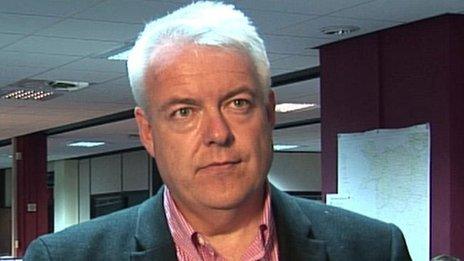
Welsh Labour leader Carwyn Jones said the party needed to do more to win back support
Mr Gill told BBC Radio Wales: "We lost every single deposit five years ago - we are now the third party in Wales."
He said under a "first past the post" system UKIP had not benefited from the share of the vote the party received.
But he added: "In the assembly elections, there is proportional representation as well as first past the post. We will get representation there."
UKIP leader Nigel Farage also welcomed the boost in support for his party in places such as south Wales and north east England.
Shortly before learning he had failed to take Thanet South from the Conservatives, he told reporters UKIP would look to future opportunities, such as next year's Welsh assembly and London mayoral elections.
Plaid Cymru leader Leanne Wood said her party's result was "not as bad as it could have been".
Plaid Cymru leader Leanne Wood says her party has laid down foundations for the 2016 Assembly elections
She insisted the party had "gone up in the Rhondda and the western valleys" and the results had "laid some very good foundations for the assembly elections next year".
"We have improved our showing," Ms Wood added.
Speaking to BBC Wales, Welsh Lib Dem leader Kirsty Williams said it would be an understatement to say she was "gutted" at her party's results, which were "truly devastating".
She added: "It seems a trend across Europe where, if you are the smaller party in a coalition government, you can get severely punished as we have done overnight for taking that decision.
"We made mistakes in that coalition government. The issue with tuition fees was fundamentally damaging to the fact that perhaps people stopped listening to what we had to say... and it was difficult to get across what we were delivering as part of the coalition."
Lib Dems' Kirsty Williams said: 'Gutted would be an understatement'
Welcoming an increase in the Greens' Welsh vote share, from 0.4% to 2.6%, the party's leader in Wales, Pippa Bartolotti, said: "We have been overwhelmed by the increase in support for Greens in Wales over recent months.
"We will build on this support over the next year in order to win seats at the assembly elections," she added.
The overall turnout for the election was 65.7%, a slight increase on the 2010 election which saw 64.9% of the population turn out to vote.
Political expert Prof Roger Scully, from Cardiff University, said the night had been historic:
It was the highest Conservative vote share in Wales since 1992
The second worst Labour vote share in Wales since 1918
Third highest Plaid Cymru vote share in a general election ever
Highest UKIP vote share in Wales in a general election
Think tank director Lee Waters told BBC Radio Wales the nation had radically changed from what was once a "Tory-free zone".
"The Conservatives now have 27% of the vote in Wales, they have got 11 seats," he said.
"Only as recent as '97 Wales was a Tory-free zone."
"Labour is still the larger party," he added, "but this is now a plural country. It's far more mixed than the story we have told ourselves."
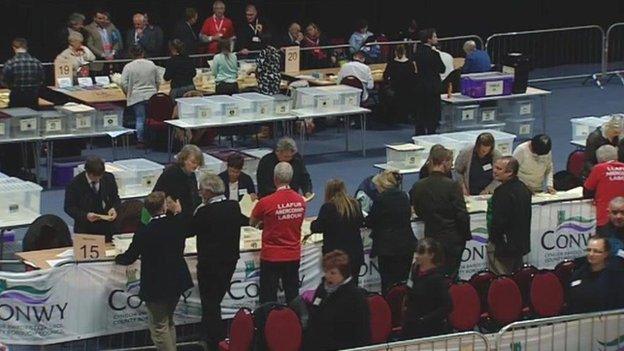
Counts took place at venues across Wales
- Published8 May 2015
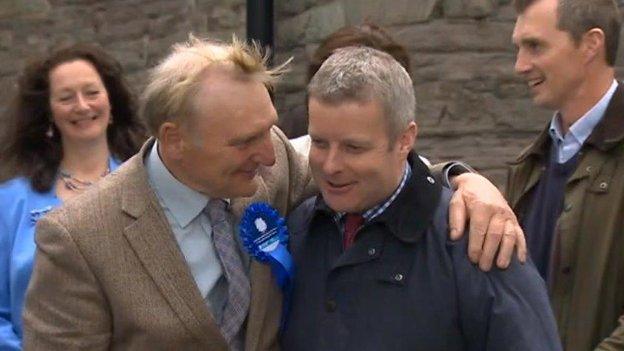
- Published8 May 2015
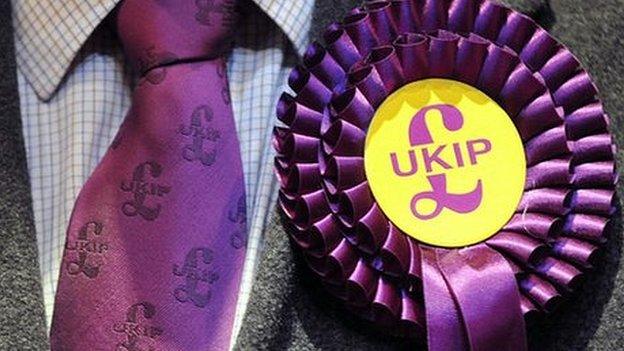
- Published8 May 2015
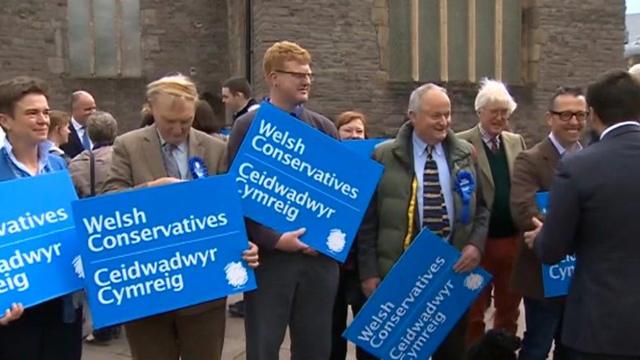
- Published8 May 2015
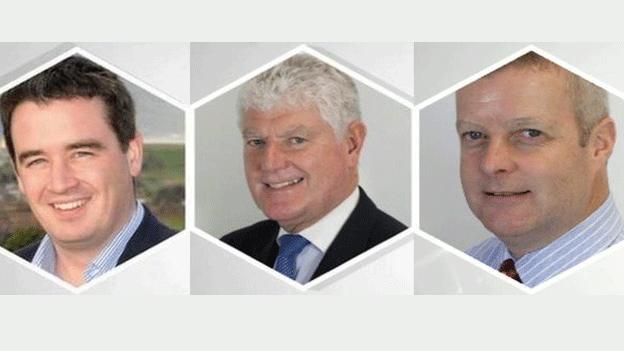
- Published8 May 2015
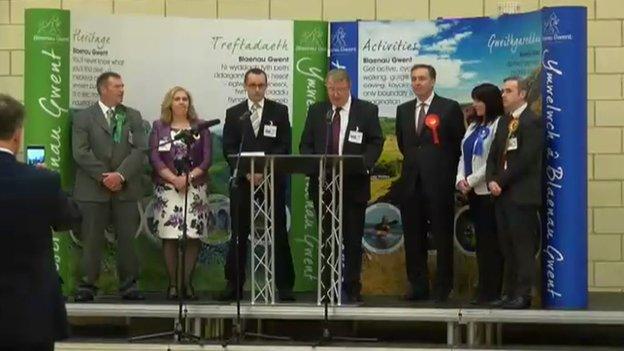
- Published8 May 2015
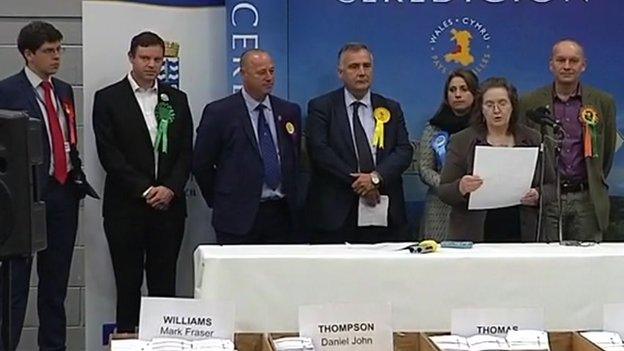
- Published8 May 2015
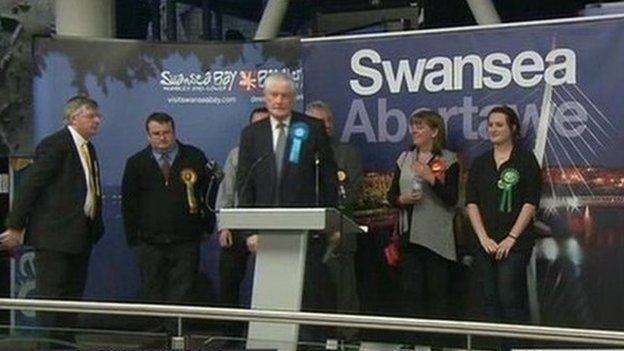
- Published8 May 2015
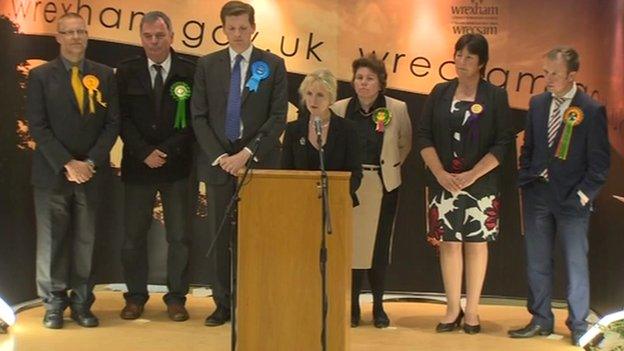
- Published8 May 2015
